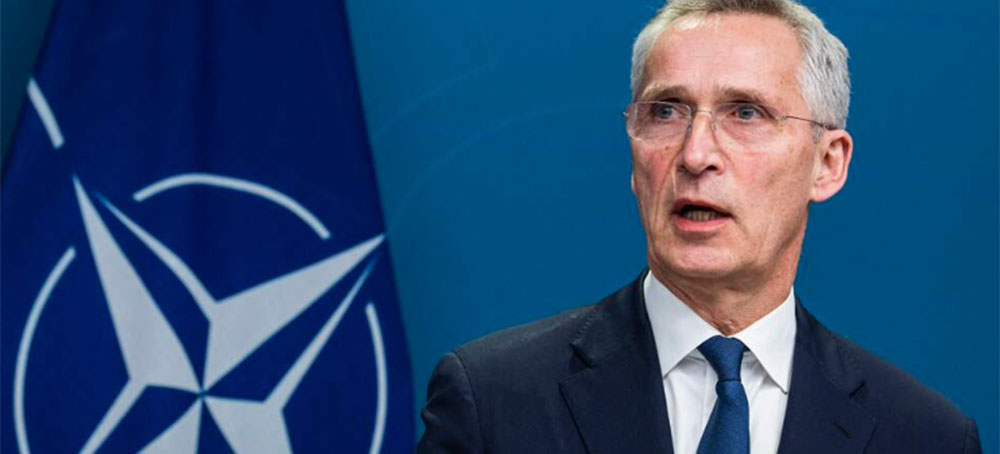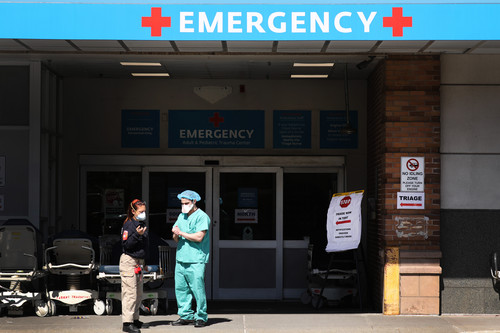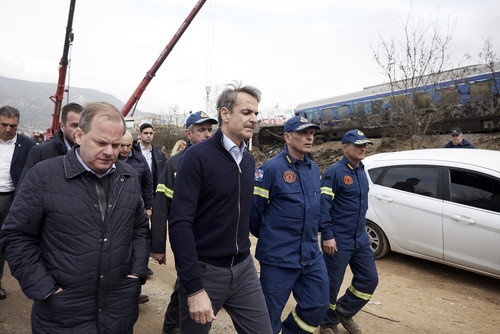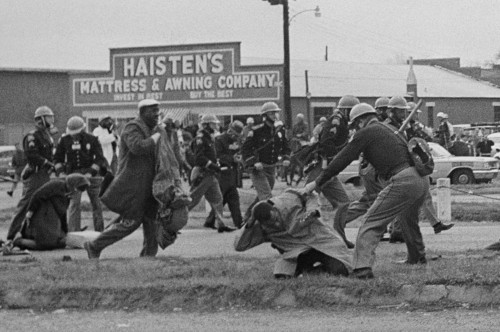Live on the homepage now!
Reader Supported News
A report in The New York Times that appears to clear the Kremlin for an attack on the pipeline last fall is serving as a key talking point for the Russian threat.
“What we know is there was an attack, there was sabotage, and this was an attack against critical infrastructure for Europe,” Stoltenberg said, speaking through a translator during a press conference alongside the Swedish prime minister. He declined to talk more about the attack until after the conclusion of several ongoing national and regional investigations but reinforced how important the assault on European infrastructure has been for the military bloc’s current collective defense.
“What we can say for certain is these attacks show the vulnerability of critical infrastructure,” he added, referencing the yet-unopened oil pipeline from Russia, through the Baltic Sea into Germany, which Moscow previously envisioned as a way to isolate Ukraine and to use as leverage against European powers. Stoltenberg also referenced the vulnerability of internet cables and other infrastructure “important to our modern societies.”
“NATO for many years has been dealing with this security infrastructure, but after the attacks in the Baltic Sea, we have doubled our military presence in the North Sea and the Baltic Sea,” he said. “We have also increased cooperation between NATO countries to exchange information and to strengthen preparedness to better stop further such attacks in the future.”
The previously scheduled press conference at NATO headquarters in Brussels was ostensibly about Sweden and Finland’s efforts to join the alliance amid new concerns about the threats they face from Russia after its invasion of Ukraine. The apparent act of sabotage on Sept. 26 has served as a key talking point for Western leaders concerned about the diverse threats Russia poses to the continent.
But questions from reporters instead centered on a report from The New York Times based on unidentified U.S. officials familiar with intelligence assessments that made several dramatic assertions, including that the Russian government does not appear to have been behind the attacks – at least not knowingly – nor did the government in Ukraine. Rather, the assessments indicate a pro-Ukrainian militia group could have carried out the sabotage operation.
Those familiar with the assessment said, according to the Times, that “there are no firm conclusions about it, leaving open the possibility that the operation might have been conducted off the books by a proxy force with connections to the Ukrainian government or its security services.”
Russia has denied any claims of involvement in the attack, repeatedly dismissing them as Western propaganda and even suggesting U.S. or allied forces carried it out to frame the Kremlin. The government of Russian President Vladimir Putin lit upon a controversial column from Pulitzer Prize-winning journalist Seymour Hersh a month ago that claimed, among fantastic assertions, that “the United States executed a covert sea operation that was kept secret – until now.”
Russia last month called for a U.N. Security Council meeting to discuss the column’s widely disputed findings – a move the State Department dismissed at the time as “another indication of the fact that Russia desperately wants to change the subject.”
“It does not want the world to be focusing on what our Ukrainian partners have achieved over the course of the past year, what the rest of the world has come together to help our Ukrainian partners to achieve, the ways in which the transatlantic community and the community of nations more broadly has never been more united, the ways in which NATO has never been stronger and more purposeful,” spokesman Ned Price said in a Feb. 22 press conference. “Again, not as a threat to Russia but as an alliance that stands to defend our countries against potential aggression.
“It is a sad, sorry state that Russia is doing this, and it’s likewise sad that Russia is finding those willing to parrot its propaganda.”
The Kremlin similarly exploited the latest story from the Times publishing several carefully framed posts through its state news service Tass that pick out details supporting its assertions – chiefly that it had no part to play and that a group at least fighting on behalf of Kyiv orchestrated the attack.
“Western media are bombarded by the news that the investigation into the terrorist attacks against Nord Stream has a version that it is, A) not Russia, B) Ukrainian groups,” Foreign Ministry spokeswoman Maria Zakharova, known for her colorful condemnations of the West, posted to her Telegram channel, according to a translation. “I wonder who allows such leaks, filling the information space with them? Answer: those who do not ... want to conduct an investigation in the legal field and are going to divert the attention of the audience from the facts in every possible way.”
“Instead of leaking to Western regimes related to the incident, we need to respond to official requests from the Russian side and, at a minimum, take into consideration the materials of the journalistic investigation of Hersh, without replacing them with anonymous stuff,” Zakharova added.
Stoltenberg said Tuesday that NATO had established a special headquarters unit to coordinate cooperation among NATO members to mitigate fallout from the attack on the pipeline, including coordinating with private companies involved in monitoring critical infrastructure across the continent.
READ MORE 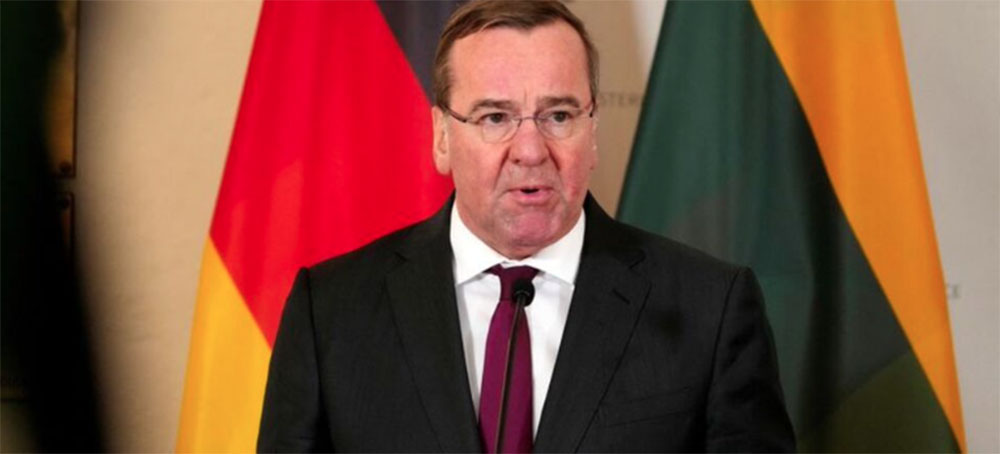 German Defence Minister Boris Pistorius speaks during news conference in Vilnius, Lithuania March 7, 2023. (photo: Ints Kalnins/Reuters)
German Defence Minister Boris Pistorius speaks during news conference in Vilnius, Lithuania March 7, 2023. (photo: Ints Kalnins/Reuters)
A New York Times report, citing intelligence reviewed by U.S. officials, said on Tuesday a pro-Ukrainian group may be behind the blasts that became a flashpoint between the West and Russia after last year's Russian invasion of Ukraine.
The report, while not pointing to any official Ukrainian involvement, comes at a time when Kyiv is urging its Western allies to ramp up supplies of high-end weapons to drive back Russian forces as the war enters its second year.
"There are ongoing national investigations and I think it's right to wait until those are finalised before we say anything more about who was behind it," said NATO Secretary-General Jens Stoltenberg.
Investigations continue into what caused the Nord Stream pipelines, supplying Russian energy to Europe, to rupture and spew bubbles of natural gas into the Baltic Sea last September. Western countries believe the explosions were deliberate but have not concluded who was behind them.
Russia, which has previously blamed the West, seized on the news on Wednesday to demand a transparent investigation in which it also wants to participate.
A separate report by Germany's ARD broadcaster and Zeit newspaper said on Tuesday the operation to place explosives on the seabed was carried out by six people, five men and one woman, who used forged passports.
They transported explosives on a yacht rented from a German charter company by a Poland-based firm owned by Ukrainian citizens, according to the report and prosecutors.
"We have to make a clear distinction whether it was a Ukrainian group, whether it may have happened at Ukrainian orders, or a pro-Ukrainian group (acting) without knowledge of the government," German Defence Minister Boris Pistorius said on Wednesday.
"But I am warning against jumping to conclusions," Pistorius said on the sidelines of a summit in Stockholm.
Pistorius said earlier the likelihood was "equally high" that it could have been a "false flag operation staged to blame Ukraine".
Germany, meanwhile, confirmed its investigators had raided a ship in January that may have been used to transport the explosives used to blow up the pipelines.
But a statement by the federal prosecutor said there was no reliable information yet on motives or perpetrators, including on whether the attack was state-sponsored.
"There is no suspicion against employees of the German company that rented out the ship," it added.
European Union foreign policy chief Josep Borrell told reporters: "As long as investigations into Nord Stream blasts are ongoing, we can not draw conclusions."
UKRAINE PLAYS DOWN CONCERNS
The New York Times said there was no evidence that Ukrainian President Volodymyr Zelenskiy or other Ukrainian government officials had played any role in the attacks.
Also in Stockholm, Ukrainian Defence Minister Oleksii Reznikov said the media reports were a "little bit strange" and had "nothing to do" with the Ukrainian government.
"It's like a compliment for our special forces," he joked. "But this is not our activity."
Reznikov said he was not worried about the prospect of the media reports weakening support for Ukraine. Pistorius batted away a similar question about Western support as "hypothetical".
Kremlin spokesman Dmitry Peskov suggested the media reports were a coordinated bid to divert attention and questioned how U.S. officials could assume anything about the attacks without an investigation.
"The very least that the Nord Stream shareholder countries and the United Nations must demand is an urgent, transparent investigation with the participation of everyone who can shed light," Peskov said.
The U.S. intelligence review suggested those who carried out the attacks opposed Russian President Vladimir Putin "but does not specify the members of the group, or who directed or paid for the operation", the New York Times wrote.
"Officials who have reviewed the intelligence said they believed the saboteurs were most likely Ukrainian or Russian nationals, or some combination of the two," according to the New York Times report.
Investigators founds traces of explosives on the yacht, which the group took from Rostock, Germany, on Sept. 6, according to ARD and Zeit. They also reported that intelligence indicated that a pro-Ukrainian group could be behind the attack, but German authorities have not yet found any evidence.
Reuters could not independently verify the information.
Russia last month gave the U.N. Security Council a draft resolution which - if adopted - would ask U.N. Secretary-General Antonio Guterres to set up an international investigation.
Follow us on facebook and twitter!
PO Box 2043 / Citrus Heights, CA 95611

